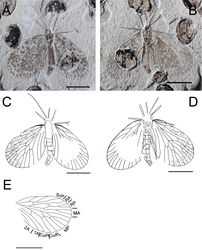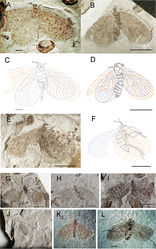Choristopsyche tenuinervis
| Notice: | This page is derived from the original publication listed below, whose author(s) should always be credited. Further contributors may edit and improve the content of this page and, consequently, need to be credited as well (see page history). Any assessment of factual correctness requires a careful review of the original article as well as of subsequent contributions.
If you are uncertain whether your planned contribution is correct or not, we suggest that you use the associated discussion page instead of editing the page directly. This page should be cited as follows (rationale):
Citation formats to copy and paste
BibTeX: @article{Qiao2013ZooKeys318, RIS/ Endnote: TY - JOUR Wikipedia/ Citizendium: <ref name="Qiao2013ZooKeys318">{{Citation See also the citation download page at the journal. |
Ordo: Mecoptera
Familia: Choristopsychidae
Genus: Choristopsyche
Name
Choristopsyche tenuinervis Martynov, 1937 – Wikispecies link – Pensoft Profile
Emended diagnosis
Forewing, RP+MA forking distal to MP forking.
Description of new material
CNU-MEC-NN2011075p/c (Fig. 1), a well preserved specimen with part and counterpart in dorsal view, with almost complete forewings, but partially preserved hind wings and body, and forewings overlapping hind wings. The terminus of abdomen is missing, sex unknown. Wings: Left forewing, length 11.0 mm, width 6.7 mm, broadly oval, RP forking distal to MA forking; MP2+3 forking basal to the forking of MA, and the stem of MP3 about twice as long as the stem of MP2+3; with one crossvein between RA and RP, and between MP2+3 and MP4; CuP, 1A, 2A single. Right forewing is similar to left forewing, but parts missing. Hind wings, smaller than forewings, overlapped by forewings, the venation visible but unclear. There are many spots on all four wings, symmetric between left and right wings.
In addition, there are nine new materials with analogous wing venation to that of specimen CNU-MEC-NN2011075p/c. They are listed as follows.
CNU-MEC-NN2011080 (Figs 2A, C), a well preserved specimen with clear wings, but parts of body, and the right forewing overlapping the right hind wing. Sex unknown. Wing: Right forewing, length 11.8 mm, width 6.7 mm, RP forking distal to the forking of MA; MP2+3 forking at about the same level as the forking of MA; the stem of MP3 about twice as long as the stem of MP2+3; with one crossvein between MP2+3 and MP4; CuP, 1A, 2A single. Left forewing is similar to right forewing, but the apex of the wing absent. Hind wings, length at about 10.1 mm, width 6.2 mm, similar to forewings but smaller. CNU-MEC-NN2009317 (Figs 2B, D), an almost complete specimen, female, with forewings overlapping hind wings, and nearly complete body, but legs absent in dorsal view. Wings: right forewing, length at about 9.5 mm, width 4.9 mm; RP forking distal to the forking of MA; MP2+3 forking at about the same level to the forking of MA; the stem of MP3 as long as the stem of MP2+3; CuP, 1A, 2A single. Left forewing is similar to right forewing. Hind wings, similar to forewings, but smaller; CuA almost straight. CNU-MEC-NN2009414 (Figs 2E, F), an almost complete preserved specimen in lateral view, female, with complete body and forewings, and right forewing overlapped with body and parts of left forewing, and right hind wing overlapped with left hind wing. The mouthparts are missing, the maxillary palpus with five segments visible. Abdomen: tapering apically, with eleven segments, and a pair of cercus can be visible, female. Wings: Left forewing, length at about 10.1 mm, width 6.4 mm, broadly oval, RP forking basal to the forking of MA; MP2+3 forking significantly basal to the forking of MA; the stem of MP3 about three times as long as the stem of MP2+3; with one crossvein between RA and RP, and between MA and MP1; CuP, 1A, 2A single. Right forewing is similar to left forewing, but there are crossveins between ScP and RA, RA and RP, MA and MP1. Hind wing: similar to forewing but smaller, RA straight, with one crossvein to RP. CNU-MEC-NN2009318 (Fig. 2G), a partially preserved specimen in dorsal view, with parts of forewings, hind wings and body, but the filiform antennae and venation visible, and the forewings overlapping the hind wings. CNU-MEC-NN2011070 (Fig. 2H), an almost completely preserved specimen in ventral view, with almost complete body and four wings, and hind wings overlapped with forewings. CNU-MEC-NN2011071 (Fig. 2I), a partially preserved specimen in dorsal view, with parts of body and forewings, but left hind wing is missing, and right hind wing is obscure. CNU-MEC-NN2009383 (Fig. 2J), a partially preserved specimen with four outspread wings and parts of body. CNU-MEC-NN2011083 (Fig. 2K), a specimen in dorsal view, female, with almost complete body but some legs not visible due to coverage by wings, and forewings overlapping hind wings. CNU-MEC-NN2011085 (Fig. 2L), a comparatively complete specimen in lateral view, male, and forewings overlapping hind wings; chewing mouthparts visible; Abdomen almost completely-preserved, the posterior six segments can be seen clearly, and abdomen bent at six and seven segment, but the posterior segments faint below the left forewing, the scorpion-like terminal visible.
New material
CNU-MEC-NN2011075p/c, CNU-MEC-NN2011080, CNU-MEC-NN2009317, CNU-MEC-NN2009414, CNU-MEC-NN2009318, CNU-MEC-NN2011070, CNU-MEC-NN2011071, CNU-MEC-NN2009383, CNU-MEC-NN2011083, CNU-MEC-NN2011085, deposited in CNUB.
Type locality and horizon
Daohugou Village, Ningcheng County, Inner Mongolia, China, Jiulongshan Formation, Middle Jurassic (Bathonian-Callovian boundary interval, ca 164–165 Ma).
Remarks
These ten specimens exhibit differences in the characters of “RP forking vs. MA forking”, “MP2+3 forking vs. MA forking” and “Length ratio of the stem of MP3 and the stem of MP2+3”, which are considered as intraspecific variations.
Taxon Treatment
- Qiao, X; Shih, C; Petrulevičius, J; Dong, R; 2013: Fossils from the Middle Jurassic of China shed light on morphology of Choristopsychidae (Insecta, Mecoptera) ZooKeys, 318: 91-111. doi
Images
|

